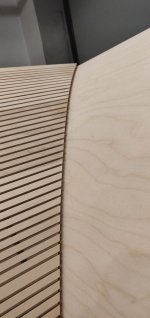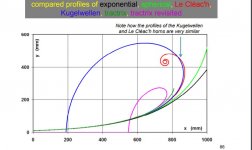I see my mistake now. Thanks for posting you numbers as that clears things up.
The plan I was going by says the mouth size is 51.6" Since no other decimal inches are used, I took this to mean 5'|6". I should have known better, as I didn't remember the mouth being that large. So I'm recalculating. Other drawings show close to this, like 4'9" or 57" Could the blueprint mean 56"? Quick, who has an original to measure? 😀
So far a 14 foot expo looks a little narrow compared to the 15A, especially at 69" which is the beginning of the wooden section.
The plan I was going by says the mouth size is 51.6" Since no other decimal inches are used, I took this to mean 5'|6". I should have known better, as I didn't remember the mouth being that large. So I'm recalculating. Other drawings show close to this, like 4'9" or 57" Could the blueprint mean 56"? Quick, who has an original to measure? 😀
So far a 14 foot expo looks a little narrow compared to the 15A, especially at 69" which is the beginning of the wooden section.
You can see the TOC on the book info page linked to in my signature.
A copy of the Table of Contents (17 pages) is attached.
Attachments
However I did recently find that if a length of 14 feet is used, with a mouth 5.5x5.5 ft wide, then a Le Cleac'h profile T=0.5 with a 1" throat comes very close. 55Hz to get the length. At least Hornresp exports a profile that comes close to the drawings. I found that exponential flared too fast in the throat.
If you used a 1" throat for this, that may explain why an exponential flare seemed to expand to rapidly, as this is twice the area of the 555 exit, which is 2.54cm2.
The LeCleac'h profile is basically a Hypex with wave front curvature correction, and is quite close to standard plane wave hypex up to CIR = 0.7 or so, the rapid flare and foldback typically becomes much more pronounced beyond this point, although there is of course a deviation all along the horn. Hypex deviates most from exponential near the throat, as you progress down the horn the negative exponential part that causes slower expansion near the throat becomes insignificant compared to the positive exponential part, and the horn becomes essentially an exponential horn near the mouth.
There is no mention of anything other than exponential (and conical) horns in the internal BTL documents or published papers, not even multiple flare exponentials.
Thanks. Yes I did use 0.7" diameter start for the throat. It's the area at the entrance to the wood section that I can't reconcile. It doesn't seem to fit into an expansion that I can generate, but I'll keep working on it.
What about mouth size? Is it 51.6" or 56"?
What about mouth size? Is it 51.6" or 56"?
Attachments
Ah, never mind. If the mouth is indeed 51.6 inches each side, then your blueprint numbers line up with a 14 foot exponential horn almost perfectly. It is indeed an Expo horn. Sorry for the confusion.
It's nice to have info straight from the source. I appreciate it!
It's nice to have info straight from the source. I appreciate it!

I was about to reply, but glad you found it. All the dimensions for the wooden section from the blueprint are in the spreadsheet in inches and mm.
Excellent! A very good match indeed, probably within the errors from slide rules, log tables and fractional inch dimensions!
How do you bend the plywood like that? It has always amazed me how people are able to make these really elaborate horn shapes out of plywood.
How do you bend the plywood like that? It has always amazed me how people are able to make these really elaborate horn shapes out of plywood.
By using groves. If you help with rest part - I can make WE15A.
Attachments
Parabolic mouth (horizontal) - for easier bending?
Thinking reciprocating horn pattern 'flip':
An externally hosted image should be here but it was not working when we last tested it.
GM
Yes close enough for a practical build. It was fun to run the numbers and I thank you for them. For me at least, the numbers show that it is definitively a pure exponential horn.Excellent! A very good match indeed, probably within the errors from slide rules, log tables and fractional inch dimensions!
Thanks also to HornResp for making this fairly easy.
You are asking the expansion eqution of the WE horn. The first quarter wavelength is forcibly exponential. The quarter wavelength is where the section area is multiplied by 23 or the diameter is about 5 times the throat. The curves bellow from Le Céac'h book shows overlaid of different curves of more than quarter wavelengths.

You can see that at 450mm where the radius is about 5 times the throat all the curves coincide with that of the exponential. What happens further which curve to follow depends upon your driver. At low frequencies the diaphragm doesnlt break up and starts moving in piston. The impedance changes and the expansion needs to adept accordingly or else the sound will be brighter if opening too fast or darker if too slow.
You can see that at 450mm where the radius is about 5 times the throat all the curves coincide with that of the exponential. What happens further which curve to follow depends upon your driver. At low frequencies the diaphragm doesnlt break up and starts moving in piston. The impedance changes and the expansion needs to adept accordingly or else the sound will be brighter if opening too fast or darker if too slow.
Attachments
I wanted to get back to this thread now that I have some free time again.
I have a vinyl cutter that should be able to cut foam board, cardboard, and that sort of stuff so I should be able to experiment with all the info posted in this thread.
Right now the only thing stopping me from cutting out some horns is software. I am trying to find a program that allows me to plot out a mathematic function and then converts that plot to a SVG or some type of vector file so that I can upload it to the cutter.
I have found a few options online, but they either aren't free, or are complicated to say the least. Im hoping you guys might have a quick and simple solution.
I have a vinyl cutter that should be able to cut foam board, cardboard, and that sort of stuff so I should be able to experiment with all the info posted in this thread.
Right now the only thing stopping me from cutting out some horns is software. I am trying to find a program that allows me to plot out a mathematic function and then converts that plot to a SVG or some type of vector file so that I can upload it to the cutter.
I have found a few options online, but they either aren't free, or are complicated to say the least. Im hoping you guys might have a quick and simple solution.
- Home
- Loudspeakers
- Multi-Way
- Help finding WE horn expansion equation




